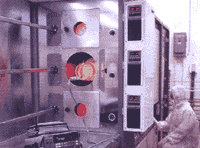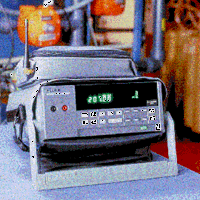Fluke Corporation
A Leader in Compact, Professional Electronic Tools
Fluke Corporation, based in Everett, Washington, is a leading international supplier of compact, professional electronic test tools used by technicians and engineers to install, maintain and service equipment containing electrical components. Its mission is to lead the market through product line breadth, manufacturing strength, and technological leadership.Fluke Corporation maintains operating divisions in the United States and the Netherlands, employing approximately 1,600 people in Washington and 2,500 people worldwide, and with annual revenues exceeding $400 million. Fluke manufactures hand-held digital voltmeters, multimeters, analyzers and oscilloscopes. The newest division creates products which test computer networks. Most of these network products were designed and produced by Forté Networks, Inc., which was recently acquired by Fluke.
Environmental Leadership Comes from the Top
Although the electronics industry has a reputation as a relatively "clean" industry, it takes continuous effort to remain "clean." In this respect, Fluke has gained a reputation as an industry leader.Environmental management at Fluke is exemplified by the efforts of Chairman and Chief Executive Officer, Bill Parzybok. He believes in the importance of ensuring a sustainable future that supports a healthy environment and a vibrant economy at the same time. "It is my view that an unhealthy and deteriorated environment is bad for business, as well as bad for our quality of life as individuals and as a society." He sees the two as sides of the same coin.
Environmental Policy Statement
As a direct result of the CEO's top-down commitment, Fluke has created a three-pronged environmental policy statement. First, the company considers the environmental impact of its products and processes. Second, the company balances growth with environmental protection and resource conservation in a sustainable way. Finally, Fluke communicates openly with its employees and governmental agencies. Since it was approved by the Board of Directors in November 1992, Fluke's Policy Statement has become a model for other firms.Quality and the Environment
Fluke has created Total Quality Commitment (TQC) teams to improve the company and help protect the environment. Pollution prevention efforts are completely integrated into TQC. Through quality management initiatives, Fluke encourages its employees to turn problems into opportunities for improvement. Employees' efforts are constantly reducing costs and liability risks. Various quality teams have reviewed processes, identified chemical treatment programs and designed process modifications to reduce waste generation.
Fluke continuously recognizes these efforts in its monthly employee newsletter, The InfoMeter, as well as through awards and cash rewards. In 1994, for example, the Waste Water Reduction Team won third place in the Pinnacle Award, Fluke's top award program. The team determined that capital investments and de-ionization process changes in integrated circuit production could save both water and money. One innovative change involving substituting treated water for fresh water in air scrubbers, resulting in savings of $18,000 each month.

Pollution Prevention and Waste Reduction
Fluke has a long-term strategy towards minimizing waste disposal. Because Fluke produces most of their components internally, they also create a significant amount of hazardous waste from circuit board and semiconductor manufacturing and sheet metal finishing. As a result of an initiative begun in the 1980s, hazardous waste disposal has been dramatically reduced since 1988, with a change from shipping hazardous wastes off-site to treating them on-site and recycling. Fluke committed early on to eliminate not only chlorofluorocarbons (CFCs), but all ozone depleting compounds (ODC's) from its manufacturing process within five years and six years in advance of the government requirement. These efforts reduce costs, long-term liability and risks to the environment.Environmental packaging is another concern at Fluke. The Environmental Packaging Committee found that packaging materials account for roughly 30 percent of the product's wastestream. Expanded polystyrene (EPS) is sometimes manufactured using CFCs. Through their work, the team documented that no CFCs were used by their EPS vendors, and further specified that future EPS package inserts contain at least 25 percent recycled content materials.